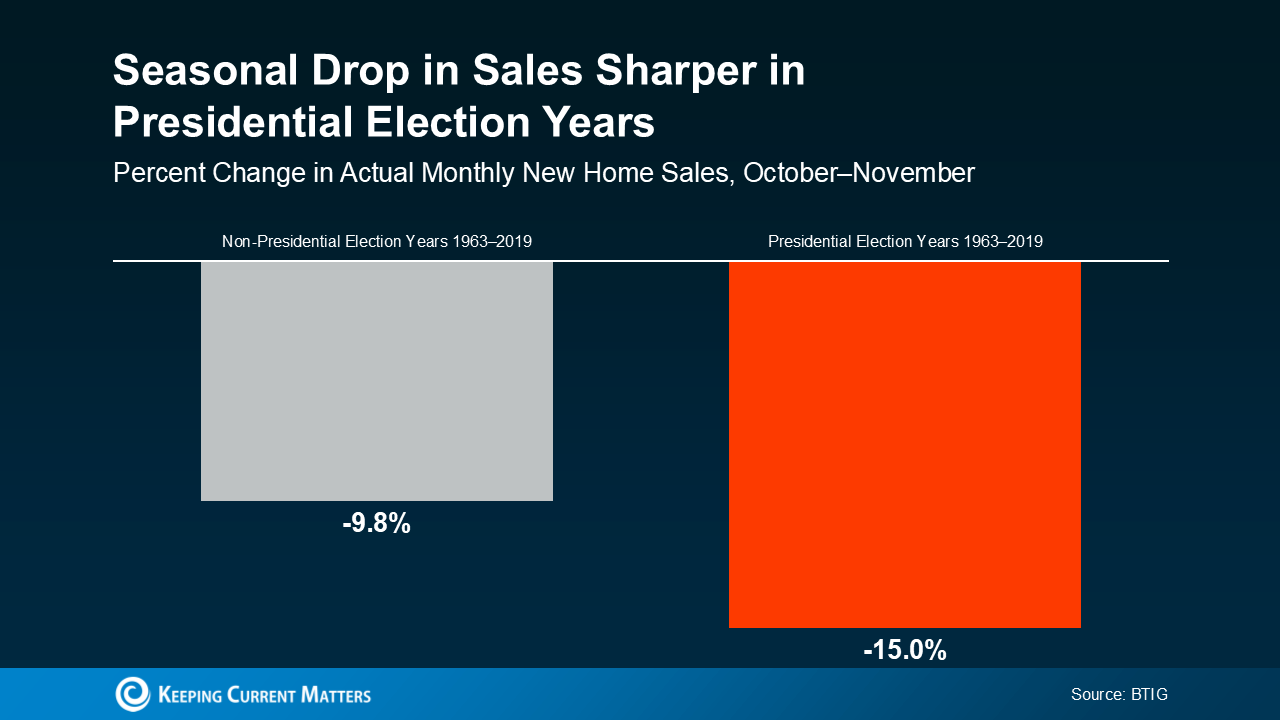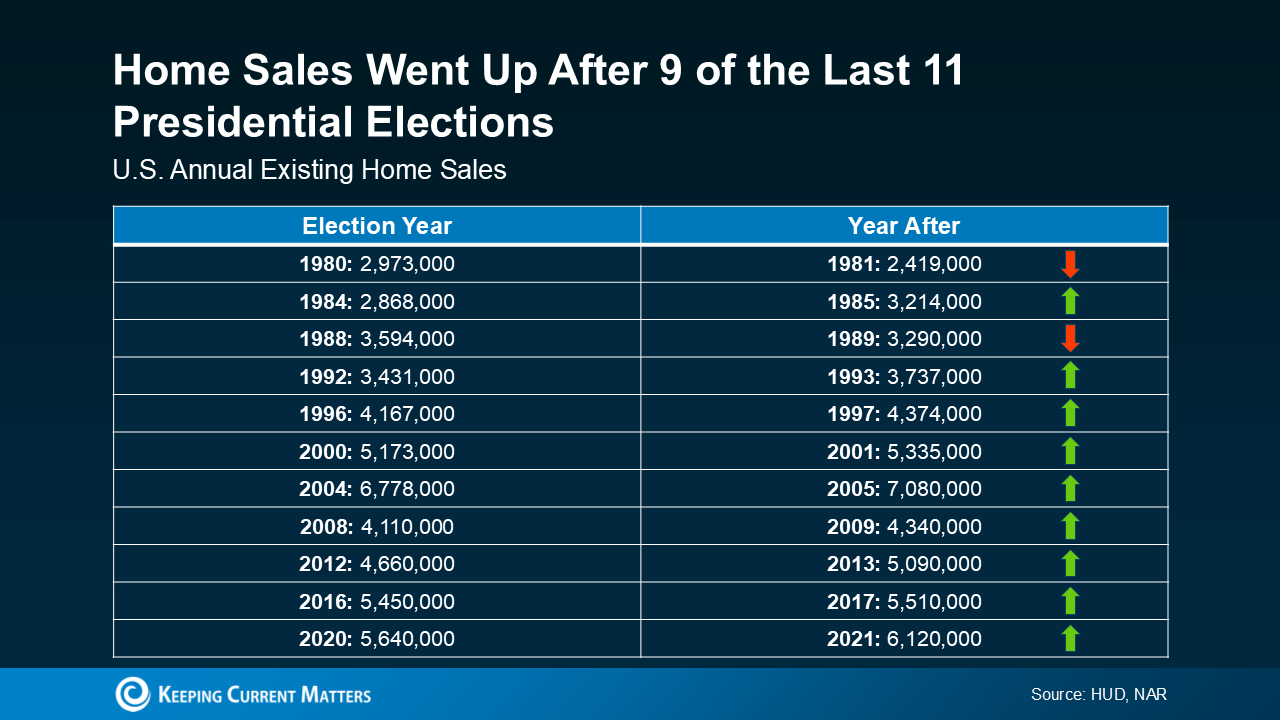Will the 2024 Presidential Election impact the Boston condo for sale market? The answer may surprise YOU
Boston condos for Sale
Loading...
Will the 2024 Presidential Election impact the Boston condo for sale market? The answer may surprise YOU
With the 2024 Presidential election fast approaching, you might be wondering what impact, if any, it’s having on the housing market. Let’s break it down.
Election Years Bring a Temporary Slowdown
In any given year, home sales slow down slightly in the fall. It’s a typical, seasonal trend. However, according to data from BTIG, in election years there’s usually a slightly larger dip in home sales in the month leading up to Election Day (see graph below):
 Why? Uncertainty. Many consumers hold off on making major decisions or purchases while they wait to see how the election will play out. It’s a pattern that’s shown up time and time again, and it’s particularly apparent for buyers and sellers in the housing market.
Why? Uncertainty. Many consumers hold off on making major decisions or purchases while they wait to see how the election will play out. It’s a pattern that’s shown up time and time again, and it’s particularly apparent for buyers and sellers in the housing market.
This year is no different. A recent survey from Redfin found that 23% of potential first-time homebuyers said they’re waiting until after the election to buy. That’s nearly a quarter of first-time buyers hitting the pause button, likely due to the same feelings of uncertainty.
Home Sales Bounce Back After the Election
The good news is these delayed sales aren’t lost forever—they’re just postponed. History shows sales tend to rebound after the election is over. In fact, home sales have actually increased 82% of the time in the year after the election (see chart below):
 That’s because once the election dust settles, buyers and sellers have a sense of what’s ahead and generally feel more confident moving forward with their decisions. And that leads to a boost in home sales.
That’s because once the election dust settles, buyers and sellers have a sense of what’s ahead and generally feel more confident moving forward with their decisions. And that leads to a boost in home sales.
What To Expect in 2025
If history is any indicator, that means more homes will sell next year. And based on the latest forecasts, that’s exactly what you should expect. As the graph below shows, the housing market is on pace to sell a total of 4.6 million homes this year, and projections are for 5.2 million total sales next year (see graph below):
 And that aligns with the typical pattern of post-election rebounds.
And that aligns with the typical pattern of post-election rebounds.
So, while it might feel like the market is slowing down right now, it’s more of a temporary dip rather than a long-term trend. As has been the case before, once the election uncertainty passes, buyers and sellers will return to the market.
Boston Condos and the Bottom Line
It’s important to remember that while election years often bring a short-term slowdown in the housing market, the pause is usually temporary. Those sales are not lost. Data shows home sales typically increase the year after a Presidential election, and current forecasts indicate 2025 will be no different. If you’re waiting for a clearer picture before making a move, just know that the market is expected to pick up speed in the months ahead.
__________________________________________________________________________________________________________________________________
The year 2020 will be remembered as one of the most challenging times of our lives. A worldwide pandemic, a recession causing historic unemployment, and a level of social unrest perhaps never seen before have all changed the way we live. Only the real estate market seems to be unaffected, as new forecast projects there may be more homes purchased this year than last year.
As we come to the end of this tumultuous year, we’re preparing for perhaps the most contentious presidential election of the century. Today, it’s important to look at the impact past presidential election years have had on the real estate market.
Is there a drop-off in home sales during a presidential election year?
BTIG, a research and analysis company looked at new home sales from 1963 through 2019 in their report titled One House, Two House, Red House, Blue House. They noted that in non-presidential years, there is a -9.8% decrease in November compared to October. This is the normal seasonality of the market, with a slowdown in activity that’s usually seen in fall and winter.
However, it also revealed that in presidential election years, the typical drop increases to -15%. The report explains why:
“This may indicate that potential homebuyers may become more cautious in the face of national election uncertainty.”
Are those sales lost forever?
No. BTIG determined:
“This caution is temporary, and ultimately results in deferred sales, as the economy, jobs, interest rates and consumer confidence all have far more meaningful roles in the home purchase decision than a Presidential election result in the months that follow.”
In a separate study done by Meyers Research & Zonda, Ali Wolf, Chief Economist, agrees that those purchases are just delayed until after the election:
“History suggests that the slowdown is largely concentrated in the month of November. In fact, the year after a presidential election is the best of the four-year cycle. This suggests that demand for new housing is not lost because of election uncertainty, rather it gets pushed out to the following year.”
Will it matter to the real estate market who is elected?
To some degree, but not in the overall number of home sales. As mentioned above, consumer confidence plays a significant role in a family’s desire to buy a home. How may consumer confidence impact the housing market post-election? The BTIG report covered that as well:
“A change in administration might benefit trailing blue county housing dynamics. The re-election of President Trump could continue to propel red county outperformance.”
Again, overall sales should not be impacted in a significant way.
Boston Real Estate and the Bottom Line
If mortgage rates remain near all-time lows, the economy continues to recover, and unemployment continues to decrease, the real estate market should remain strong up to and past the election.
Original Boston Real Estate Blog Post
For the last four years, real estate companies have had one of their own in the White House — a fact that has proven lucrative for some of the industry’s largest real estate players.
Now, Democratic presidential nominee Joe Biden has laid out changes he would make to programs and policies beloved by the Boston real estate industry. In some cases, he has been fairly specific and in others vague: During his nomination acceptance speech Thursday night, he took aim at the 2017 federal tax law, calling it a “$1.3 trillion tax giveaway to the wealthiest 1 percent.”
“We don’t need a tax code that rewards wealth more than it rewards work. I’m not looking to punish anyone. Far from it,” he said. “But it’s long past time the wealthiest people and the biggest corporations in this country paid their fair share.”
Here are some of the key issues that could impact the Boston real estate market moving forward as we wait for November election and what actions Biden has pledged to take if he defeats President Donald Trump:
Real Estate Opportunity Zones
Included as part of the Republicans’ federal tax overhaul in December 2017, the Opportunity Zones program offers capital-gains tax breaks to developers who invest in one of more than 8,700 designated areas across the U.S. Trump has lauded the program for pouring investment into previously “neglected neighborhoods,” as the initiative encourages development in distressed “zones.”
But the program has also drawn criticism for benefiting deep-pocketed developers without enriching the targeted communities. A report by the Urban Institute last month concluded as much. In January, the Treasury Department launched an investigation into the program.
Citing similar criticism, Biden has indicated that he would reform the program. The former vice president has proposed requiring recipients of the tax breaks to make public disclosures of their investments and the impact on local residents in terms of housing affordability, poverty, and job creation. He has also called on opportunity funds — money raised to take advantage of the tax break — to incentivize partnerships with nonprofits and community groups.
Chinese businesses in the U.S.
After the Trump administration raised the prospect of banning Beijing-based ByteDance, the parent of social media app TikTok, from operating in the U.S., the president inked an executive order that gave the company an ultimatum: Find a buyer for its U.S. operations in 45 days or leave the country. The order prevents “any transaction by any person” in the U.S. with TikTok. A similar order was signed barring transactions with WeChat.
Fair housing
Last month, Trump fully appealed the Affirmatively Furthering Fair Housing rule, touting that doing so would save suburbs from having to welcome low-income housing. The 2015 rule required local governments receiving federal housing financing to identify discriminatory housing practices in their communities and devise a plan to combat them.
Biden has said he would reinstate the rule. While supported by affordable housing advocates as a step toward adding some lower-cost housing to the suburbs, the rule is one of many efforts that, collectively, have been resisted and evaded by much of suburbia.
Real Estate 1031 exchanges
Just three years ago, it seemed like-kind exchanges would die on the Trump administration’s watch. The 1031 tax code provision, which allows investors to defer taxes by rolling their capital gains on recent property sales into new properties, was on the chopping block as part of the 2017 tax overhaul. Instead, the policy was changed to apply exclusively to real estate, excluding other assets such as artwork.
As part of a broader plan to roll back Trump-era tax cuts, Biden has proposed making 1031 exchanges available only to those making less than $400,000 a year. The change would help raise revenue for Biden’s $775 billion plan to fund child care and care for the elderly over the next decade. While many in the industry are skeptical that Biden would follow through with restricting 1031s, they assert that doing so would hurt an already struggling economy.
“It would just pull the rug out from underneath a very huge part of the economy,” Stuart Saft, head of the real estate department at law firm Holland & Knight, told TRD following news of Biden’s plan. (Saft’s assessment of the impact might be a stretch, but his sentiment reflects how near-and-dear 1031 exchanges are to the industry.)
The Tax Cuts and Jobs Act of 2017 implemented a $10,000 cap on deductions of state and local taxes. That aspect of the law disproportionately hit high-tax states such as New York and New Jersey, where tax bills typically exceed $10,000. Property taxes alone can be several times that amount, as can state and city income taxes, and the change put a chill into the tri-state area’s residential market.
Back in December, House Democrats passed a bill that would have increased the SALT cap to $20,000 in 2019 and then done away with it entirely in 2020 and 2021. The change, however, did not sit well with the Republican-controlled Senate, as the GOP sees SALT deductibility as a subsidy to high-tax blue states. Democrats have since fought to include language in the next Covid-19 relief package that would eliminate that cap.
If a measure to get rid of the cap were to pass both houses, Biden likely would support it. Trump has promised to veto earlier attempts, although he was initially surprised and pledged to look into the deduction cap when Democratic leaders complained to him directly about it — even though he had signed the bill enacting it.
Original Boston Real Estate Blog Post
IS THE BOSTON CONDO MARKET AFFECTED BY A PRESIDENTIAL ELECTION?
According to an economic study, elections cause a decline in the number of national home sales as well as a slight price decrease. The decline is greater in tighter elections where there is increased uncertainty. Other market factors, such as growth per capita income play an influence.
WHY DO ELECTIONS AFFECT BOSTON CONDO PRICES?
How does a Presidential election affect your Boston condo value? One potential explanation according to a study states: “Election years can be stressful and uneasy for many Americans.” And people are less likely to make large purchases, such as a Boston condo for sale, in uncertain times. The results of the election can potentially affect our finances, so fewer people are willing to invest in a Boston condo purchase when their financial future appears to be uncertain or influenced by a president. I can see this, I’m not trying to be funny here, but in the upcoming 2020 election our choices might be between a wanna be Billionaire or a Socialist. Oh how I yearn for days of Reagan vs Mondale.
REALTY TODAY STUDY
Realtytoday.com conducted a survey during the 2008 election and found that “the election was really weighing on the minds of the would-be buyers.” Different presidents in their respective parties may have different housing and mortgage policies that may affect buyers in various ways (some Presidents may not even have a housing policy). These risks can be concerning to potential Boston downtown condo buyers, and as a result, may choose to wait and buy during a time that appears to be more “politically stable”. I encourage my Boston condo buyers not to wait for a “politically stable time” otherwise I might be out of business or dead (I’m closer to 60 than 40)
WHAT DOES THIS MEAN FOR BUYERS AND SELLERS TODAY?
.
Although some Boston condo buyers may be skeptical of purchasing a home with an election year not far away, this could be a good time to buy a Boston condo for sale for anyone willing to take on additional uncertainty and risk. One positive, interest rate cuts may be on the horizon. (See the video below)
BOSTON CONDO SELLERS
Realtytoday.com states that it is generally harder to sell homes during election years; therefore, it may take longer to find a buyer, and the sales price may be slightly lower than anticipated. for sellers, it may be more beneficial to list your Boston condo in 2019 (NOW) before the 2020 election, if possible. Selling now could mean that the value of your home would be slightly higher, creating a larger return on your investment. If interested, call me and lets discuss the marketing of your Boston condo for sale
CONCLUSION
If I were a Boston condo Seller on the fence of whether to list my property now or in 2020, I would do it NOW
Perhaps Boston condo buyers and sellers should pay closer attention to the upcoming election if considering a real estate transaction.
Oh, I almost forgot to tell you……… we might be going into a Recession. (see the video below)
Have a great day.
Boston condos for Sale
Loading...